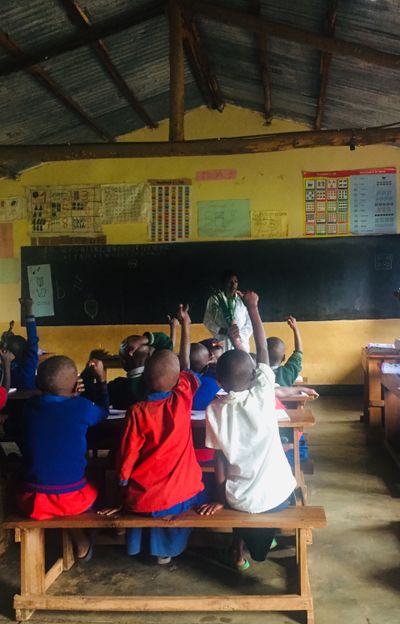Kinjojo Primary School: A Case Study in Excellence

Hayley Niad, Program Manager and Researcher, Inclusive Development Partners
After driving an hour on a bumpy, dirt road in rural, mountainous Rwanda, I arrived at the gates of Kinjojo Primary School in Gicumbi District. Immediately, I noticed some distinguishing features of this school as compared to the other primary schools I had visited in the same week. As soon as my colleagues Winnie, Charles, and I exited our car, we were directed to walk back towards the school gates in order to wash our hands with the soap and water provided at a portable sink stationed there. We were told all adults and children were required to do the same each day. As we turned to walk back to the school, we noticed spotless and manicured school grounds. The school director was prepared for our visit and gave us a warm welcome.
Of course, the true reason my colleagues and I had visited was to see a first grade (Primary 1) classroom implementing Universal Design for Learning (UDL) instruction, and a woman named Dorothee serving as the teacher. As we entered Dorothee’s humble classroom, we noticed it was clean and organized, with well-maintained print-rich materials adorned on all four walls (each wall showing materials from a different subject). Forty-eight students sat quietly at their benches and desks, eager and engaged to begin their Kinyarwanda lesson.
As I watched Dorothee’s lesson unfold over the next hour, I experienced a mixture of joy and astonishment. After having received only four days’ training with our pilot program, Dorothee – who was already an experienced teacher – implemented the principles of UDL like a seasoned expert. She advanced seamlessly between the use of a visual schedule, demonstration of concrete objects, small group reading practice, and student practice with locally made manipulative materials. Her classroom management skills were tremendous, and the young boys and girls read from their textbooks and wrote in their notebooks with skill far beyond what could be expected for two months’ schooling, let alone a year’s schooling for some other students in Rwanda. Dorothee called upon a variety of learners to answer questions, encouraged them to turn and talk in pairs, and supported struggling learners adeptly. She even used differentiated instruction to provide more skilled learners with advanced practice.
I was astonished to see the students’ textbooks in a near-new condition, despite the fact that they had been distributed more than a year before. My fears that this condition was due to a lack of use were quelled when I learned that the school had required every child to bring a backpack to school in order to conserve their materials, and that the teacher had provided special instructions to children on how to care for their books so that their younger siblings could one day use them.
In fact, the more I learned about the school, the more I came to appreciate the role that community involvement and school leadership has played in its success. The head teacher seems to know each of his students individually, and is actively involved in assessing them to identify struggling learners. After attending the training on UDL, the head teacher called a community of practice meeting with his entire school to talk about how UDL could be applied in all levels and not just the first grade. Moving forward, we spoke about incorporating UDL across the board into his existing subject-matter communities of practice for mathematics, science, or languages, instead of creating a standalone community of practice for UDL.
The head teacher has also invented his own strategy for supporting struggling learners. He has personally met with the parents of his students, whether by going to their homes or churches or workplaces, and showed parents their own children’s learning results. After explaining the need for additional practice to parents of struggling learners, the head teacher organized weekend lessons for remedial instruction. Knowing that parents would be reluctant to pay fees for extra lessons, he waited until struggling learners were demonstrating academic success as a result of the weekend classes, and then parents voluntarily contributed after they could see the benefits of this education. After having visited many other schools with absent or less involved head teachers, it was clear that a great factor in this school’s success was the genuine care and leadership that the head teacher demonstrates.
Critiques of applying UDL in low-resource environments sometime center around fears that already overburdened teachers cannot manage to add another skillset to their sometimes limited repertoire. Indeed, some teachers are still struggling to master the use of foundational literacy methods using a scripted lesson plan from the project’s teachers’ guide. But cases of Dorothee and her actively engaged head teacher help to challenge these narratives, and demonstrate clearly what is possible when the right combination of willpower, hard work, and training and experience come together. Dorothee and her head teacher are not just great examples for the case of Rwanda but for the global education community. They should be recognized as the experts that they are, and help skeptics to remember what great potential exists in this world.
